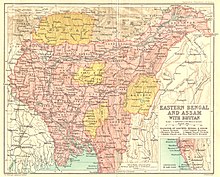| Backergunge Bakarganj বাকেরগঞ্জ | |||||||||||
|---|---|---|---|---|---|---|---|---|---|---|---|
| District of the Bengal Presidency | |||||||||||
| 1760–1947 | |||||||||||
|
Flag | |||||||||||
 Backergunge District in a 1909 Eastern Bengal map of The Imperial Gazetteer of India | |||||||||||
| Capital | Barisal | ||||||||||
| Area | |||||||||||
• 1901 | 11,763 km2 (4,542 sq mi) | ||||||||||
| Population | |||||||||||
• 1901 | 2,291,752 | ||||||||||
| History | |||||||||||
• Establishment of the district | 1760 | ||||||||||
• Partition of India | 1947 | ||||||||||
| |||||||||||
| Today part of | Bangladesh | ||||||||||
| This article incorporates text from a publication now in the public domain: Chisholm, Hugh, ed. (1911). "Backergunje". Encyclopædia Britannica (11th ed.). Cambridge University Press. | |||||||||||
Backergunge, Backergunje, Bakarganj, or Bakerganj was a former district of British India. It was the southernmost district of the Dacca Division. The district was located in the swampy lowlands of the vast delta of the Ganges and the Brahmaputra rivers.
Backergunge District was established in 1760 under the Bengal Presidency.[1] In 1947 the district became part of East Pakistan. The area of the former Backergunge district is now covered by the Barisal Division of Bangladesh. The current administrative division also contains a Barisal District and a Bakerganj Upazila.
